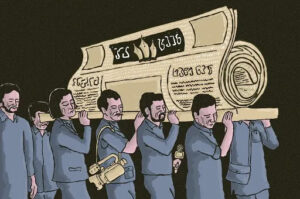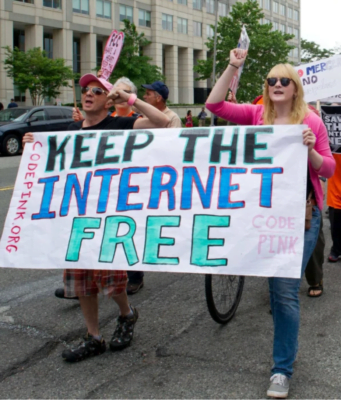
Disappearing media
This is the 199th edition of SHuSH, the official newsletter of the Sutherland House Inc.

The Internet Archive is a US-based digital platform with over three million books and a declared mission of providing \”universal access to all knowledge.\” Interested in reading Charlotte Gray’s Reluctant Genius: The Passionate Life and Inventive Mind of Alexander Graham Bell? Or Margaret Macmillan’s Paris 1919: Six Months That Changed The World? All you have to do is log on, sign up, and start reading.
Who could argue with “universal access to all knowledge?” The only people I can think of are writers, booksellers, publishers, agents, and anyone else who makes a living in the book trade.
Publishers, in particular, object to the Internet Archive. A coalition of them, including Hachette, HarperCollins, and Penguin Random House, is arguing in Manhattan federal court that its model of “controlled digital lending” of scanned books is mass copyright infringement. The outcome of this suit could have a profound impact on the future of book publishing.
The Archive counters that its service is no different than traditional library lending. It buys its books through legitimate channels and limits its digital lending just as regular libraries do.
The publishers say that’s “a rhetorical smokescreen for industrial-level infringement.”
In some of their filings, the publishers have expressed concern for the welfare of authors whose sales are being undermined by the Archive. The US Author’ Guild several months ago stated that “while we are not a party to the suit, [we] stand firmly alongside the publishers in fighting to stop the Internet Archive’s blatant assault on copyright.” It claims the platform’s practices are “illegal\” and “piracy, pure and simple, however artfully disguised as ‘fair use’ and a public service.”
The Internet Archive was developed by Brewster Kahle (below), an MIT-educated tech dude who made a ton of money selling technology to the likes of AOL and Amazon. His own fortune secure, he’s now decided that it’s best for the world if writers, publishers, agents, and booksellers can’t make a living.
Says the Authors Guild:
Mr. Kahle evangelizes the credo “information wants to be free,” but authors, whose median income from full-time writing is a stark $20,300, are paying the cost. Time and again, we have explained publishing economics to Mr. Kahle and Internet Archive supporters—the simple fact that authors need to be able to earn from their writing in order to keep writing, and that copyright licensing is how authors make a living. More than 6,000 authors and their supporters petitioned him to stop. But our appeals fell on deaf years. Mr. Kahle himself made hundreds of millions of dollars selling patented technologies to companies like Amazon. He could have given his patents away and made his technology open source, but he chose not to. Yet he expects authors to stand by in silence while their works are copied and distributed without permission.
Of course, authors are a diverse lot. Last week, 300 of them, including Neil Gaiman, Naomi Klein, and Cory Doctorow, released a letter under the banner of Fight for the Future accusing the publishers of a disinformation campaign that will undermine public libraries:
Libraries are a fundamental collective good. We, the undersigned authors, are disheartened by the recent attacks against libraries being made in our name by trade associations such as the Association of American Publishers and the Publishers Association, undermining the traditional rights of libraries to own and preserve books, intimidating libraries with lawsuits, and smearing librarians.
Fight for the Future was founded a decade ago to protest congressional efforts to address online piracy and has since kept busy criticizing big tech firms. It goes on to demand that “publishers, distributors, and their trade associations” respect the right of libraries to own and loan books on reasonable terms regardless of format, and end lawsuits their “tasteless” and “inaccurate” campaigns against librarians.
One might wonder how Fight for the Future made the leap from a lawsuit against a business posing as a library to the notion that publishers are undermining public libraries. Part of the answer is that the Internet Archive does its best to obliterate any distinction between what it does and what real libraries do: “The future of library lending is at stake in this lawsuit,” it says on its blog. “We will keep fighting to prove that copyright does not stand in the way of a library’s right to do what libraries have always done: lend the books it owns to one patron at a time.”
The Authors Guild, backed by seventeen other arts organizations including the Canadian Authors Association, the Writers’ Union of Canada, the European Writers’ Council, and the UK’s Society of Authors, is fighting back against Fight for the Future. It is “deeply troubled” by the dissenters’ “highly misleading” letter which falsely equates the Internet Archive with regular public libraries:
The truth is that the lawsuit is completely unrelated to current practices of real libraries. The Internet Archive’s Open Library operates an unlicensed digital copying and distribution business that copies millions of literary works without permission and gives them away for free in direct violation of U.S. copyright law.
The guild noted that if Internet Archive were to succeed in its mission, any website or online business that “calls itself a library could scan books and make them publicly available—a practice engaged in by ebook pirates, not libraries.” It even went so far as to contact a number of the signatories to the letter, including Daniel Handler of Lemony Snicket fame who subsequently disavowed Fight for the Future’s campaign and claimed to have been misled about the purpose of the letter.
Contacted by Publishers Weekly after the Authors Guild response, Fight for the Future seemed to shift its argument, claiming to be primarily concerned with “the prospect of a tightly controlled digital library space in which libraries cannot own and collect digital books as they have traditionally done.”
This is a related but different matter. Public libraries have been upset for some time with the terms on which publishers are selling ebooks to them. While physical books are sold to libraries to keep and lend until they fall apart, ebooks and audiobooks, which don’t fall apart, are often sold as licenses that permit a certain number of loans and then expire, terms designed to protect author incomes and publishing revenues.
“Because libraries are attempting to defend their age-old right to own, loan, and preserve books regardless of format,” says Lia Holland of FFTF, “some publishers and trade associations are labeling them as pirates or mouthpieces for Big Tech, even naming them as the reason that authors and publishing workers are grossly under-compensated. This sort of rhetoric is excessive, unnecessary, and dangerous. It\’s damaging to our democracy…”
I haven’t seen a lot of publisher attacks on public libraries, at least not outside the columns of SHuSH. In any event, the FFTF, both in its original argument and this revised statement, is putting itself in opposition to publishers and authors trying to make their livings by selling books, and on the side of the knowledge-is-free crowd
So there is a lot at stake in Hachette et al. v Internet Archive. I’m still trying to decide where I stand. I think there ought to be a book trade and I oppose piracy but beyond that it gets complicated.
Is there really a difference between ebook pirates and public libraries?
Internet Archive isn’t a business as the Authors Guild asserts; it’s a registered nonprofit—a species that sits between businesses and governmental units (traditional public libraries). It lends digital copies of books it owns, just as libraries do. It earns revenue through some of its services but so do public libraries. It would seem to make sense that nonprofits, for-profits, and governments should all be allowed into the library game so long as they respect copyright laws, which expressly provide for lending services.
So far, the courts appear to be favoring publishers and authors on these matters. In a related copyright case earlier this year, a federal judge supported an Association of American Publishers’ request for an injunction against the state of Maryland which was trying to dictate the (better) terms on which libraries could acquire ebooks for lending.
Much more to learn. We’ll be returning to this soon.

This is the 199th edition of SHuSH, the official newsletter of the Sutherland House Inc.

There was an interesting piece in the New York Times a week or so ago about James Daunt (above), the incoming chief executive of Barnes & Noble, the most important bookstore chain in the English-speaking world. It didn’t quite get to the nub of the matter. Barnes & Noble has

The world of non-fiction from Sutherland House ( and Beyond )